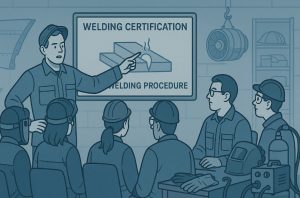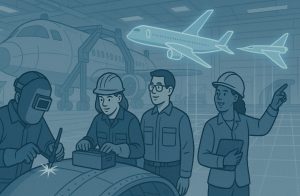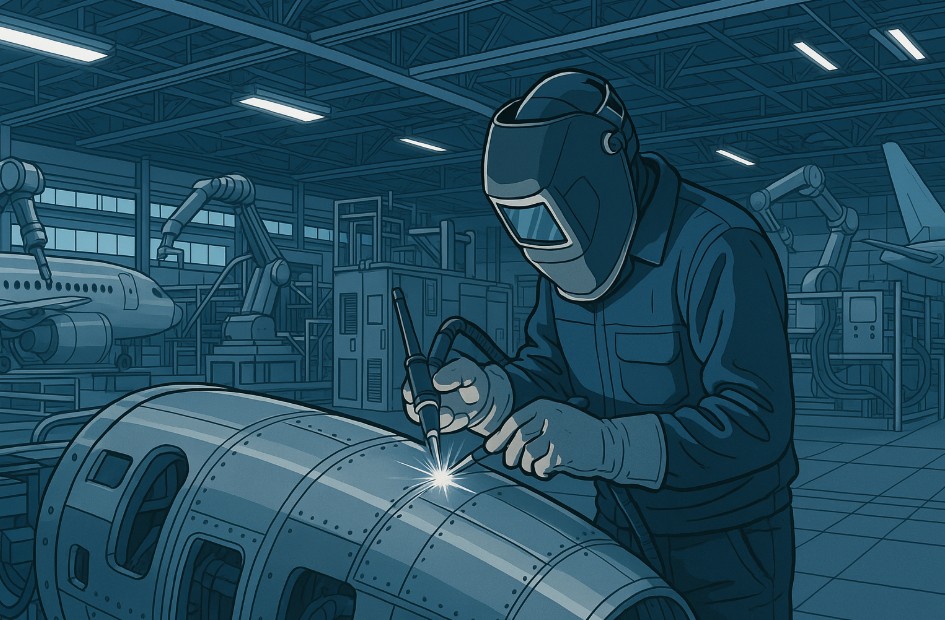Aerospace Welder Salary in the UK: What Do Skilled Welders Really Earn in 2025?
Why Is Aerospace Welding Considered a High-Demand Career in the UK?
The UK aerospace sector is a cornerstone of national industry, accounting for over £35 billion in annual turnover and employing more than 100,000 workers.
The country is home to major aerospace manufacturers such as Rolls-Royce, BAE Systems, and Airbus UK, all of which require the expertise of certified welders to construct, maintain, and innovate aircraft components.
As air travel modernises and demand for fuel-efficient aircraft rises, the need for specialised welding in materials like titanium, aluminium alloys, and composite metals becomes crucial.
These jobs require welders with a high level of precision, often under strict regulatory and safety requirements.
Aerospace welders are not generalists; they are skilled professionals trained to operate in one of the most demanding technical fields. With an increasing number of UK-based aerospace contracts, particularly in defence and sustainable aviation, the sector is actively seeking talent, making aerospace welding a resilient and lucrative career path.
What Is the Average Aerospace Welder Salary in the UK in 2025?

The average base pay for aerospace welders in the UK has steadily increased in recent years.
According to salary data collected from industry platforms like Glassdoor, Indeed, and TotalJobs, welders in this field typically earn between £23,000 and £35,000 annually as their base salary in 2025.
However, this is only part of the total compensation. Additional forms of income such as bonuses, commissions, and profit sharing can significantly increase annual earnings.
The average additional pay is estimated to be £6,797, bringing the total average compensation to approximately £35,373 per year.
Salary Breakdown for Aerospace Welders (2025)
| Component | Amount (Annual) | Notes |
| Base Pay Range | £23,000 – £35,000 | Varies by region and experience |
| Average Base Pay | £28,576 | Based on median data |
| Additional Compensation | £1,000 – £7,000+ | Bonuses, profit sharing, commission |
| Total Average Salary | £35,373 | Including all compensation sources |
This data is considered reasonably accurate and reflects current hiring trends in 2025. Users and professionals regularly contribute to these figures on platforms like Glassdoor, enhancing the accuracy of national salary estimates.
How Much Do Certified Aerospace Welders Earn Compared to Entry-Level Positions?
Certification plays a significant role in determining salary within aerospace welding. Entry-level welders typically earn near the lower end of the pay range.
These are often individuals still completing apprenticeships or just entering the aerospace field after general welding experience.
Certified aerospace welders, particularly those holding qualifications such as BS EN ISO 9606, CAA aerospace welding certifications, or ASME Section IX, tend to command far higher salaries.
This is due to the technical demands of the role, safety criticality, and the high precision required in aerospace manufacturing and maintenance.
Comparison of Salaries by Experience Level
| Experience Level | Estimated Annual Salary | Notes |
| Apprentice/Entry-Level | £23,000 – £28,000 | Basic skill set, training still in progress |
| Junior Aerospace Welder | £28,000 – £32,000 | Some experience, possibly partial certification |
| Certified TIG/MIG Welder | £36,000 – £45,000 | Fully certified, specialised in aerospace applications |
| Senior Aerospace Welder | £46,000 – £55,000+ | Extensive experience and high-level certifications |
Welders specialising in TIG techniques for aluminium and titanium alloys—commonly used in aircraft fuel systems, frames, and engine components are particularly in demand and therefore earn at the higher end of the scale.
What Qualifications Are Required to Increase Aerospace Welder Earnings in the UK?

To earn a higher salary in aerospace welding, individuals must pursue formal qualifications and hands-on training recognised by the industry.
These certifications are essential to meet the regulatory and safety standards expected in aviation and defence contracts.
Key qualifications that enhance earning potential include:
- NVQ Level 3 in Fabrication and Welding Engineering Technology
- City & Guilds Welding and Fabrication (Level 2 and 3)
- BS EN ISO 9606-1 and ISO 14732 certification
- CAA Authorised Welder Certification (for aircraft maintenance and repair)
- ASME Section IX (for advanced pressure vessel and structural welds)
Many welders enter the industry via aerospace engineering apprenticeships, which blend academic study with practical work over 3–4 years.
These programmes are typically employer-sponsored and lead to long-term employment, with increased pay upon completion.
Which Aerospace Welding Jobs Pay the Highest in the UK?
The most lucrative aerospace welding roles are often highly specialised and may involve working under security clearance, on military contracts, or with cutting-edge aerospace technologies such as composite welding or additive manufacturing.
Top-paying job types include:
- TIG Welders working with lightweight aircraft components (e.g., engine casings, fuel tanks)
- Aerospace Fabricators skilled in creating aircraft frames and subassemblies
- Coded Welders with security clearances (SC/DV), typically working on Ministry of Defence projects
- Non-Destructive Testing (NDT) Certified Welders, combining inspection and weld repair
These roles are mostly concentrated around major aerospace hubs such as Bristol, Farnborough, Derby, and Preston, where companies like Rolls-Royce, BAE Systems, and Airbus UK operate.
What Is the Total Career Pay Trajectory for Aerospace Welders?
Aerospace welders enjoy a clear and structured pay progression, often starting in apprenticeships and advancing to senior positions or even engineering roles over time.
Career Progression and Pay Trajectory
| Career Stage | Years of Experience | Salary Range | Common Role Titles |
| Apprentice | 0–2 years | £18,000 – £22,000 | Trainee Welder, Apprentice Fabricator |
| Junior Welder | 2–4 years | £23,000 – £28,000 | Junior Welder, TIG Welder (Basic) |
| Certified Welder | 4–7 years | £30,000 – £42,000 | Aerospace Welder, Coded TIG Welder |
| Senior Welder | 7–10 years | £45,000 – £55,000+ | Senior Welder, Lead Fabrication Technician |
| Welding Manager/Inspector | 10+ years | £50,000 – £60,000+ | Welding Supervisor, QA Inspector, Engineer |
Some professionals choose to transition into welding inspection, quality assurance, or engineering roles, which can push earnings beyond the £60,000 mark with the right qualifications.
What Is the Job Outlook for Aerospace Welders in the UK in 2025?

The outlook for aerospace welders remains highly positive, driven by multiple national and international factors.
The UK Government has committed to long-term investment in aerospace through initiatives such as the Aerospace Growth Partnership and Jet Zero Strategy, both of which are expected to sustain or increase demand for skilled manufacturing personnel.
Additionally, the push towards green aviation, including electric and hydrogen-powered aircraft, is creating new demand for welders skilled in emerging technologies.
The increasing complexity of aircraft structures means manual welding expertise remains indispensable, despite some automation trends.
With the growth of defence projects, commercial air travel, and R&D in sustainable technologies, aerospace welding is expected to remain a strong career choice through the remainder of the decade.
What Is the Regional Breakdown of Aerospace Welder Salaries in the UK?
Location significantly influences pay in the aerospace sector due to differences in demand, employer size, and living costs.
Aerospace Welder Salaries by Region (2025)
| Region | Entry-Level | Mid-Level | Certified | Senior |
| South East England | £26,000 | £33,000 | £44,000 | £55,000+ |
| Midlands | £25,000 | £31,500 | £42,000 | £52,000 |
| North West England | £24,000 | £30,000 | £40,000 | £48,000 |
| Scotland | £23,000 | £28,000 | £38,000 | £45,000 |
| Wales | £22,500 | £27,000 | £36,500 | £43,000 |
| Northern Ireland | £22,000 | £26,500 | £35,000 | £42,000 |
Areas near Bristol, Farnborough, and Derby typically offer the highest salaries due to the presence of large aerospace employers and subcontractors.
Is Aerospace Welding a Financially Rewarding Career in the UK?

Aerospace welding is not only a financially rewarding profession but also a stable one with global opportunities.
While the initial training period can be intensive, the long-term benefits include high salary potential, opportunities for career advancement, and job security in one of the UK’s most resilient sectors.
As the aerospace industry continues to evolve with new technologies and sustainability goals, qualified welders who keep their skills and certifications up to date will remain in strong demand.
The career also allows for international mobility, with British aerospace qualifications being recognised globally.
Frequently Asked Questions
What welding technique is most in demand in the UK aerospace industry?
TIG (Tungsten Inert Gas) welding is the most in demand due to its suitability for thin, high-performance materials like aluminium and titanium.
How do aerospace welder salaries compare to other engineering jobs in the UK?
While generally lower than chartered engineering roles, certified aerospace welders can earn salaries similar to mid-level mechanical or maintenance engineers, particularly in specialised positions.
Are aerospace welders paid hourly or on a salary basis in the UK?
Full-time aerospace welders are typically paid on a salary basis, though contractors and freelance welders are often paid hourly, sometimes with premiums for night shifts or weekend work.
What industries pay more than aerospace for welders in the UK?
The oil and gas, nuclear, and offshore wind sectors often offer higher wages, but these roles may come with more physically demanding environments or require travel to remote locations.
Do aerospace welding apprenticeships offer competitive pay?
Yes. Aerospace apprenticeships often start around £18,000–£22,000 per year and include progressive pay increases as skills and responsibilities grow.
How long does it take to become a certified aerospace welder in the UK?
It typically takes 3–5 years, including formal education, on-the-job training, and certification testing.
Is aerospace welding a good long-term career choice in the UK?
Yes. Aerospace welding offers steady demand, strong salaries, and upward mobility, particularly for those committed to continual learning and certification.







